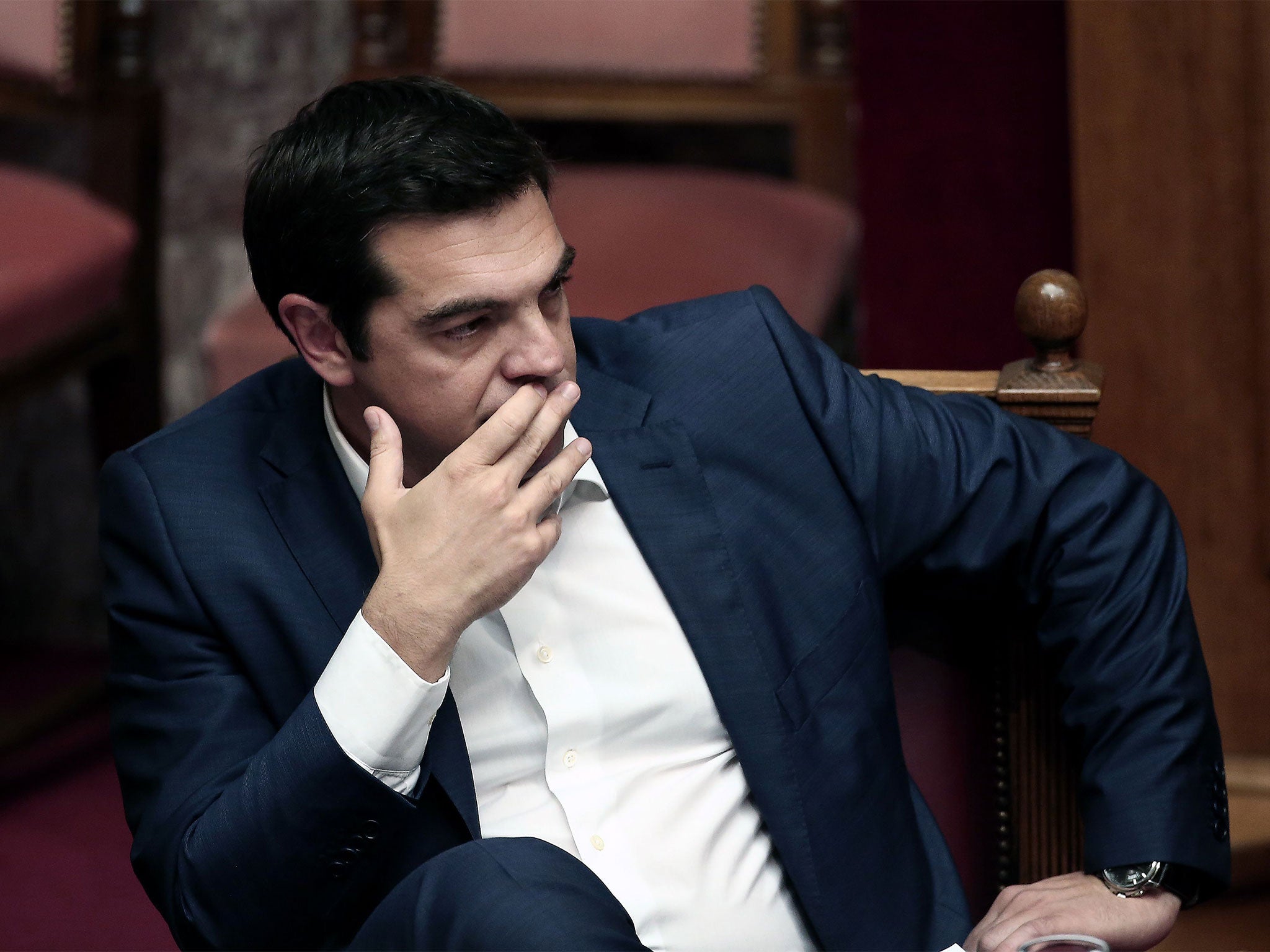Greece crisis: Alexis Tsipras dismisses 'irrational' proposals for country's debt repayment
Mr Tsipras’s speech came the day after his government announced it would not pay an IMF debt repayment due

Your support helps us to tell the story
From reproductive rights to climate change to Big Tech, The Independent is on the ground when the story is developing. Whether it's investigating the financials of Elon Musk's pro-Trump PAC or producing our latest documentary, 'The A Word', which shines a light on the American women fighting for reproductive rights, we know how important it is to parse out the facts from the messaging.
At such a critical moment in US history, we need reporters on the ground. Your donation allows us to keep sending journalists to speak to both sides of the story.
The Independent is trusted by Americans across the entire political spectrum. And unlike many other quality news outlets, we choose not to lock Americans out of our reporting and analysis with paywalls. We believe quality journalism should be available to everyone, paid for by those who can afford it.
Your support makes all the difference.Greek Prime Minister Alexis Tsipras has told an emergency session in parliament that time is running out as the country attempts to swerve bankruptcy, but said the government cannot accept the “irrational” proposals made by its bailout creditors.
The meeting was held a day after his government announced it would not pay an International Monetary Fund (IMF) debt repayment, and will instead group the four instalments due in June into one payment at the end of the month.
Markets around the world reacted nervously to the move that is a first for a developed economy.
Tsipras told politicians he was "unpleasantly surprised" by the proposal put forward by the IMF, European Central Bank and European Commission during his visit to Brussels for talks with commission head Jean-Claude Juncker.
"I would like to believe that this proposal was an unfortunate moment for Europe, or at least a bad negotiating trick, and will very soon be withdrawn by the same people who thought it up," he said.
He added, according to The Guardian: “Time is not only running out for us, it is running out for everyone. Greek people should be proud because the government is not going to give into absurd proposals.”
However, he said he remained optimistic that a deal was closer than ever, and insisted that Greece needs to strike a solution to what he described as a vicious circle of austerity and debt leading to economic contraction and poverty.
"We don't just need an agreement, we need a definitive solution, both for Greece and for Europe, that will finally end the talk of a Greek exit from the eurozone," he said.
“The fiscal strangulation of a country is a moral issue that conflicts with Europe's founding principles — which raises well-founded questions on Europe's future,” he said.
“There is no question of our accepting an agreement that does not contain the prospect of debt restructuring," he added.
The Greek government has attempted to minimise the breadth of the austerity measures in the country, by attempting to strike a deal with creditors over the release of the 7.2 billion euros remaining from its 240 billion-euro bailout fund.
Without the sum of money, Greece will be unable to meet its steep debt repayments to the IMF and European Central Bank over the next few months - leaving the nation staring bankruptcy in the face, with an exit from the euro a likely outcome.
"The probability of an eventual debt default has clearly risen, which could set off a process that includes capital controls to prevent meltdown in the Greek banking system," said Neil MacKinnon, global macro strategist at VTB Capital.
The Greek public voted Tsipras and his radical left Syriza party into power in January, and handed them a mandate to end austerity measures brought in after Athens started to rely on bailout payments from international creditors in 2010.
In order to pay upcoming debts, Greece has reached deep into its public purse, further sparking fears that it will be unable to pay the IMF back at the end of the month.
Reacting to the impasse, several members of Tsipras' cabinet blamed eurozone-IMF lenders for the impasse, with calling for a break with creditors. At least two ministers have said that if the lenders don't back down from their current positions, one option would be to call for elections in Greece and ask the population whether they want to remain in the euro at any cost.
"The government will not go back on the promises we made to the Greek people. Let the Europeans assume the responsibility if there is a split with lenders," Health Minister Panagiotis Kourouplis told Antenna television.
Additional reporting by Reuters and AP
Join our commenting forum
Join thought-provoking conversations, follow other Independent readers and see their replies
Comments